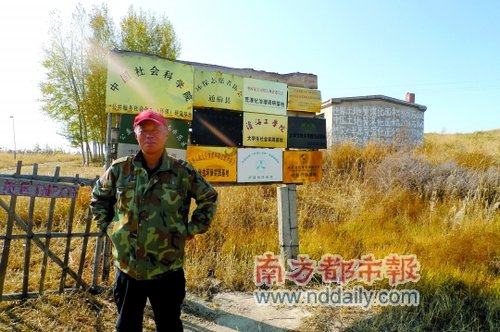(Ecns.cn)--Wan Ping, 59, once an engineer at a state-owned company, decided to get out of the rut and start a new life in the desert over a decade ago with the ambition of transforming the growing sand dunes into an oasis.
In June 2010, Wan resigned from his secure, highly paid job in Jilin Province, and moved to the Korqin Sandy Lands bordering Jilin and Inner Mongolia, which, according to Wan, used to be a prosperous agricultural and grazing area before the 19th century.
However, reality is harsh and Wan's dream hasn't always gone exactly as planned. "It's easy to fight against sand, but hard to change people's traditional mindset that 'planting trees is the best cure for desertification,' and even harder to stop the heavy grazing and massive land reclamations by the locals," pointed out Wan.
For 11 years, Wan has been constantly challenged by economic, social, and political pressures while he continued to throw his own money into an environmental project that is not likely to bring back any returns.
On June 12, 2000, Wan rented 85 hectares of sandy land that he thought was suitable for forest near Xinhe Village, a region with a small number of residents that has been hit hard by desertification.
"It will be quite encouraging and convincing if I could improve the environment here. And since the population is sparse, there will be less conflicts," thought Wan at the very beginning.
Yet, the results were disappointing and unexpected after three years of hard work. Wan planted 30,000 sea buckthorns and 10,000 poplar trees in the spring of 2001, but none of them survived.
"There has never been a forest in Korqin, only grassland," concluded Wan, realizing that covering the sandy land with grass would be a much better way to fight against desertification. This idea was proven right the next year and he won support from experts at the Chinese Academy of Sciences.
Wan also noticed then that on sandy lands outside his pilot area, local government was still trying to cope with desertification by planting trees, an outdated method that could achieve little.
"I planned to make a proposal with experts that government should stop planting alien tree species," recalled Wan. "Excessive irrigation will result in alkali soils; while the local plants can grow very well without much water."
As grass flourished and animals began settling down on Wan's land, troubles came.
Hunters from Inner Mongolia occasionally came to chase animals and residents of the Xinhe Village also grazed their pigs and cattle there very often. Some even started reclaiming farmland from nearby grasslands. Wan's 4,000-meter long guardrail was constantly being destroyed.
"I am making desperate efforts to combat desertification on the one hand, while the local farmers have kept destroying the grassland on the other hand. There are more than 10 flocks of sheep in Xinhe Village," said Wan.
Wan tried to send letters to each family to ask them keep their livestock away, but was totally ignored. He also filed a complaint to the local forestry bureau, and again received the cold shoulder.
Wan then sued the bureau for neglecting his case and asked for 968 yuan in compensation. There was finally an investigation into the damage, which resulted in more railings being ruined.
"Several cars came that day, pushing over 1,200 meters of guardrails," said Zhao Derong, a local resident who is assisting Wan on his land.
Wan eventually failed in the lawsuit after a one-and-a-half-year fight. He then decided to dip into his own pocket to compensate some locals for staying away from his land.


















